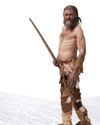
When he’s not out in the field, he teaches primate biology and does research at Liverpool John Moores University in England.
Wich has pioneered the use of new technology in conservation. In 2011, he and his colleague Lian Pin Koh of the National University of Singapore (NUS) in Asia built and tested one of the first drones used to study wildlife. One year later, the pair founded ConservationDrones.org. This organization helps wildlife researchers around the world use drone technology.
In 2019, Wich started another technology project, called Conservation AI. This time, he partnered with some of his colleagues at Liverpool John Moores University: computer scientists Carl Chalmers and Paul Fergus and astrophysicist Steven Longmore. Conservation AI is an online platform offering machine learning models that tag images from drones and camera traps. The platform has processed 18 million images, and counting.
Wich’s main area of interest, though, has always been primates and the tropical forests where they live. He is an editor of the book Orangutans: Geographic Variation in Behavioral Ecology and Conservation.
WHAT GOT YOU STARTED STUDYING ORANGUTANS?
I started during my master’s studies at the University of Utrecht [in the Netherlands] in 1993, focusing on a site in Sumatra with some really amazing lowland forest and beautiful large fig trees. The university had a research site there, and I applied for a chance to go. I was lucky enough to be selected.
This story is from the {{IssueName}} edition of {{MagazineName}}.
Start your 7-day Magzter GOLD free trial to access thousands of curated premium stories, and 9,000+ magazines and newspapers.
Already a subscriber ? Sign In
This story is from the {{IssueName}} edition of {{MagazineName}}.
Start your 7-day Magzter GOLD free trial to access thousands of curated premium stories, and 9,000+ magazines and newspapers.
Already a subscriber? Sign In

A 12-Year-Old Girl's Election Sticker Is a Winner
VOTING IS A FUNDAMENTAL FREEDOM FOR AMERICANS, A MEANS OF DOING ONE'S CIVIC DUTY AND A WAY AN INDIVIDUAL CAN EXPRESS THEIR VOICE. In 1971, the United States lowered its voting age to 18. But that doesn't mean kids and teens under 18 can't participate in elections in various ways.

If everything the human brain does is basically sets of electrical impulses, how exactly does that translate into a state of mind?
You're not the only one asking this question. Every neuroscientist in the world is wondering the exact same thing, says Zach Mainen

EARTH'S TINIEST BUILDERS
THE HIDDEN WORLD OF MICROBES IN THE EARTH'S CRUST

MUMMIES SPEAK
ABOUT MICROBES, MIGRATION, AND MORE

GOING WITH YOUR GUT
HOW DO MICROBES AFFECT OUR HEALTH? LET'S COUNT THE WAYS...

BUG Detective
A burglar sneaks into a house on a quiet street in New York City. He walks through the house, touching countertops and door handles. Finally, he steals a single card from a full deck. Then he leaves.

Little Creatures Among Us THE MANY MICROBES IN OUR DAILY LIVES
When you think you're alone, you're actually not. In the ground, the air, your room, and even your body are Strillions and trillions of creatures so tiny you can't see them.

A Mars Rock Found With Leopard Spots Could Be a Sign of Ancient Life
IN JULY, NASA'S PERSEVERANCE ROVER CAME ACROSS A SPOTTED ROCK IN WHAT WAS ONCE A RIVERBED IN THE JEZERO CRATER ON MARS.

Para Athlete Uses Exoskeleton Suit to Carry the Olympic Torch
In July, a 36-year-old French tennis para athlete, Kevin Piette, got a chance to participate in this summer’s Olympic torch relay without using a wheelchair.

Ancient Egyptians May Have Used a Water System to Lift Stones to Build Pyramid
HOW ANCIENT EGYPTIANS BUILT THE MASSIVE PYRAMIDS IN EGYPT MORE THAN 4,000 YEARS AGO HAS LONG BEEN A TOPIC OF WONDER AND DEBATE.